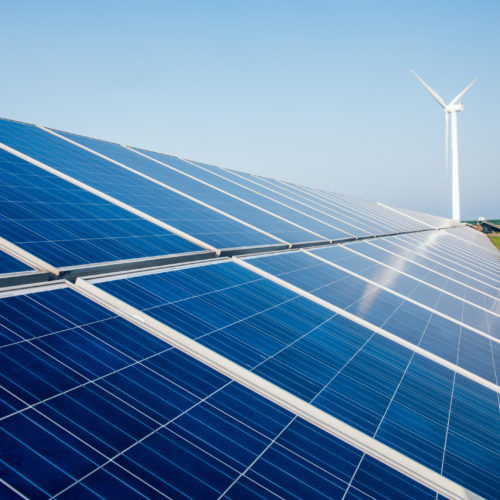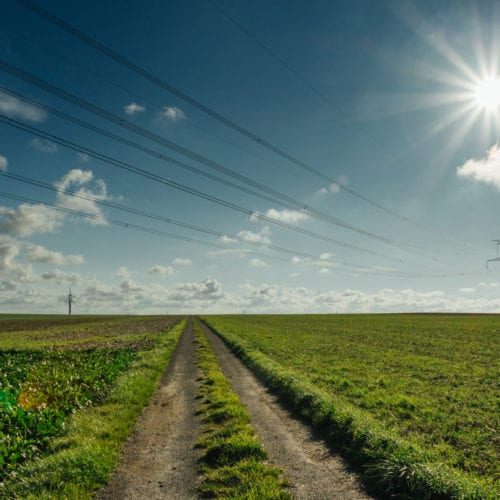Texas state of United States flag on flagpole textile cloth fabric waving on the top sunrise mist fog

Texas’s X Factor
Meeting the State’s Growing Energy Needs With a Clean, Resilient Energy Supply
When it comes to its energy use, Texas really is bigger. On an absolute basis, the Texas energy sector emitted nearly twice as much carbon dioxide as the second-highest-emitting US state and accounted for more than 12 percent of all US carbon emissions in 2016 (the latest year for which Department of Energy statistics are available). In fact, the state’s emissions rate increased by almost 30 percent between 1980 and 2016.
Due to the outsized carbon-abatement opportunity Texas presents, combined with the state’s abundant solar resource, Rocky Mountain Institute’s Shine™ team is working with electric cooperatives and municipal utilities to speed the development of distributed energy resources (DERs), including distribution-scale solar installations and clean energy technologies like battery storage and demand response.
The Lone Star State Goes Solar
After all, Texas is no stranger to renewable energy and its benefits to customer bills, clean air, and local economic development. Wind energy provided 18.6 percent of the state’s energy use in 2018 and now makes up nearly a quarter of this year’s grid capacity, according to Texas’s state grid operator. Yet solar energy has barely registered.
Encouragingly, however, RMI is beginning to see signs of a market shift toward greater adoption of solar power in the Lone Star State. For example, acting as the buyers’ representative, RMI supported the purchase of 7 megawatts (MW) of new distribution-scale solar by five electric cooperatives in Texas. The solar arrays for each of the buyers will be sited on their respective distribution systems, thereby avoiding Electric Reliability Council of Texas (ERCOT) demand charges and generation capacity charges from their generation and transmission providers.
Considering these demand-charge savings in addition to the low price of the solar energy produced, RMI believes the portfolio of solar systems will provide more total value to the buyers than a utility-scale solar installation would. RMI and partners in the state are in late-stage discussions to facilitate additional distribution-scale solar procurements. For more information on the attractive economics of distribution-scale solar in Texas and beyond, have a look at RMI’s recent blog and report.
Texas at a Crossroads
Increasingly, the state stands at a crossroads in determining how to supply energy to cool its homes and fuel its businesses. As Texas’s economy expands and its population grows, so too does its need for additional sources of energy. Its current energy supply is showing increasing strain, with anticipated record electricity demand confronting historically low dedicated energy reserves, according to ERCOT. And with the June 1 start of the 2019 hurricane season and with memories still fresh of 2017’s Hurricane Harvey—resulting in the state’s third 500-year flood since 2015 and causing an estimated $125 billion in damage—the value of resilience and decentralized, localized supplies of power has only grown in the public’s consciousness. The emergence of new technologies and business models now offers Texans the opportunity to create a new, more cost-efficient and economic growth-generating paradigm.
e–Lab Forge: Texas 2019
To further accelerate the adoption of distribution-scale solar and other DERs, RMI will convene Energy Innovation Lab (e–Lab) Forge: Texas 2019, an invitation-only facilitated workshop to advance innovative clean energy projects in the state. Scheduled for September 16–18 outside Austin, the event will bring together teams working on high-impact, scalable ideas and projects in distribution-scale solar energy, battery storage, and other distributed clean energy solutions.
The dynamic two-and-a-half day working session will host as many as seven teams with the highest-potential ideas and projects selected from across the state. Trained facilitators and technical experts will lead teams through effective collaborative processes and provide customized coaching, training, and feedback to support each team’s unique project.
In support of recruiting project teams for e–Lab Forge: Texas 2019, RMI will host a webinar on June 10 at 11 a.m. Mountain Time to offer additional context on the history of e–Lab, discuss the planned scope of the event and key topical areas, and answer participant questions. Register here.
While e–Lab Forge: Texas 2019 is the most comprehensive convening RMI has hosted to spur development of DERs in the state, other recent e–Lab events also covered issues relevant to DERs in Texas. The most recent e–Lab Accelerator hosted a multistakeholder Promoting Texas Non-Wires Solutions team, and one of the topic pods at e–Lab Summit 2018, Transforming Rural Electric Supply, included a number of representatives from electric cooperatives that worked together to overcome grid challenges like those facing cooperatives in Texas.
With these learnings in hand, in the coming weeks and months the Shine team will relay in greater depth how we expect to support and accelerate the growth of clean, efficient, renewable energy and DERs in the Lone Star State through e–Lab Forge and other efforts. Owing to the size of the opportunity, we still have much to discuss.


